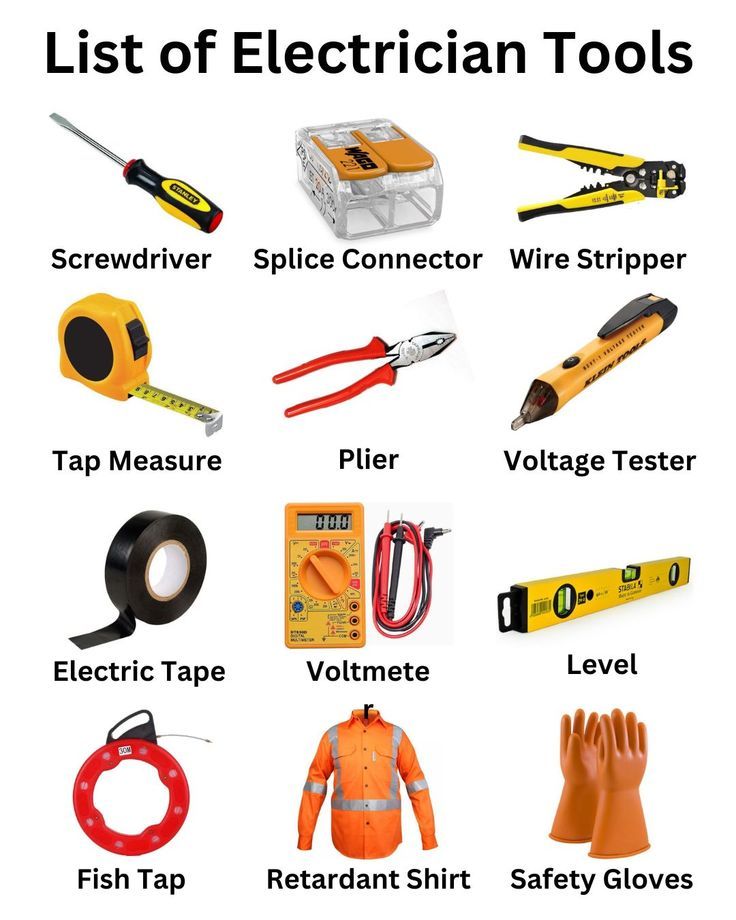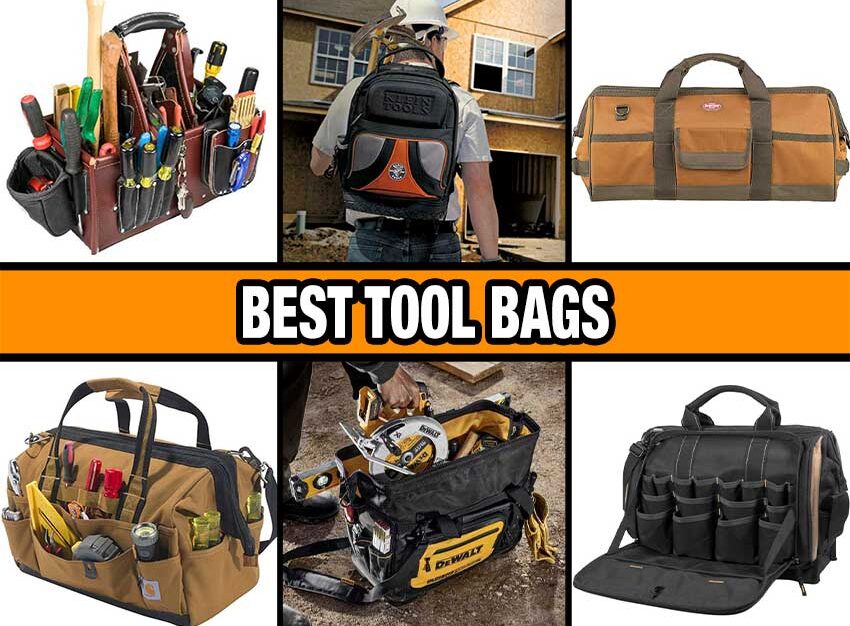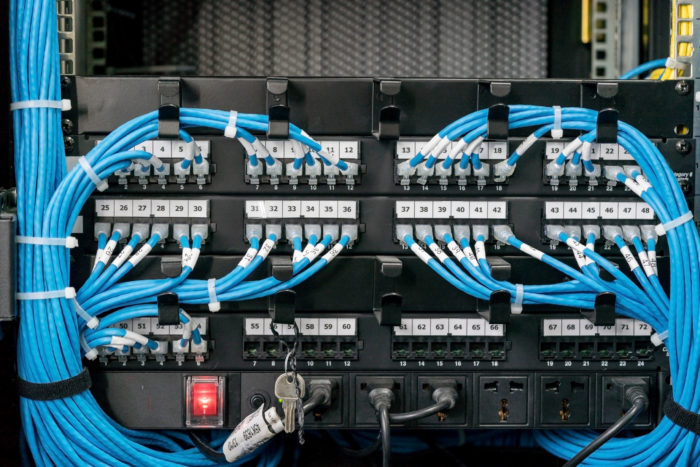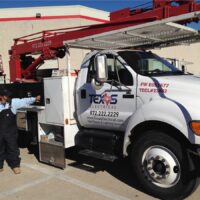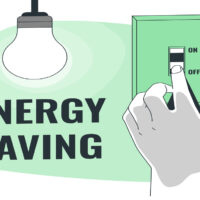Electricians need specific tools to perform their work efficiently and safely. Essential tools include pliers, screwdrivers, and wire strippers.
Electricians rely on a range of specialized tools to complete their tasks effectively and maintain safety standards. Pliers are crucial for gripping and bending wires, while screwdrivers are needed for fastening and loosening screws. Wire strippers are essential for removing the insulation from electrical wires without damaging the conductors.
Other important tools include voltage testers, which ensure circuits are safe to work on, and fish tapes, which help in pulling wires through conduits. Having the right tools not only enhances productivity but also ensures the quality and safety of electrical work. Investing in high-quality tools is vital for any professional electrician.
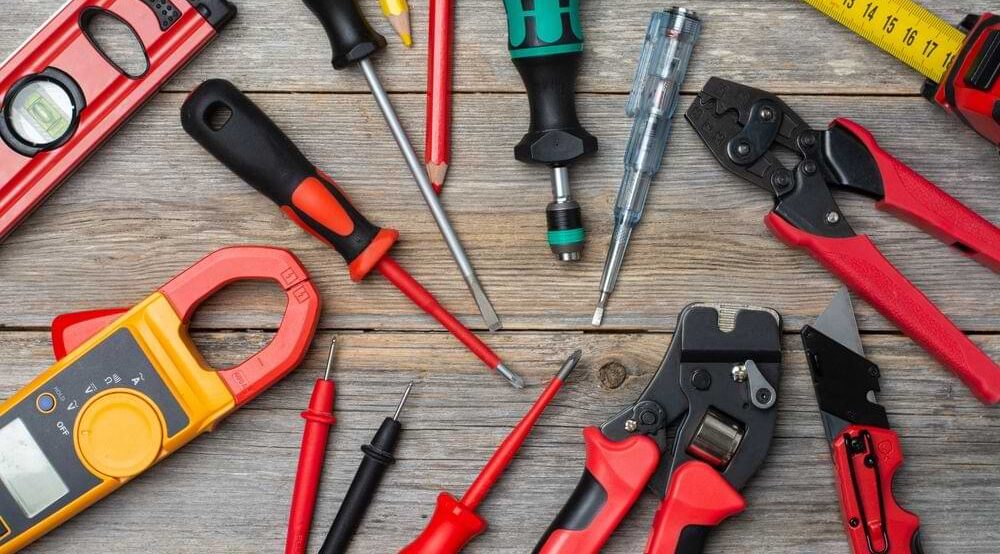
Credit: www.workiz.com
Basic Hand Tools
Every electrician needs a set of basic hand tools. These tools help them work safely and efficiently. Let’s explore some of the most essential tools.
Screwdrivers
Screwdrivers are crucial for electricians. They help tighten or loosen screws. There are different types of screwdrivers:
- Flathead Screwdriver: Ideal for slotted screws.
- Phillips Screwdriver: Perfect for cross-head screws.
Electricians often use insulated screwdrivers. These provide safety from electrical shocks.
Pliers
Pliers are versatile tools. They can grip, twist, and cut wires. Here are some common types:
- Needle-Nose Pliers: Reach tight spaces easily.
- Linesman Pliers: Great for cutting and twisting wires.
- Diagonal Pliers: Best for cutting wire cleanly.
Good quality pliers make an electrician’s job easier.
Wire Strippers
Wire strippers are essential for removing insulation from wires. They ensure wires are not damaged. Wire strippers usually have:
- Marked Gauges: Help in stripping wires of different sizes.
- Sharp Cutting Edges: Provide a clean cut without fraying.
Using wire strippers properly ensures safe and effective wiring.
Power Tools
Electricians rely on various power tools to perform tasks efficiently. These tools save time and reduce manual effort. Let’s explore some essential power tools every electrician should have.
Drills
Drills are crucial for electricians. They help create holes in walls, ceilings, and other surfaces. Electricians use them to install wiring, outlets, and fixtures. Cordless drills offer more mobility, making them highly popular. Key features include:
- Variable speed settings
- Interchangeable bits
- Lightweight design
High-quality drills enhance productivity and precision.
Saws
Saws are indispensable for cutting various materials. Electricians often need to cut through wood, metal, and plastic. Different types of saws include:
- Reciprocating saws
- Circular saws
- Jigsaws
Each type serves a specific purpose. For instance, reciprocating saws are perfect for demolition work. Circular saws ensure straight cuts, while jigsaws handle intricate shapes. The right saw makes the job easier and safer.
Impact Drivers
Impact drivers are powerful tools for driving screws and bolts. They provide extra torque, which is essential for tight and secure fittings. Key advantages of impact drivers include:
- Increased power and speed
- Less strain on the wrist
- Compact and lightweight design
These features make impact drivers a must-have in every electrician’s toolkit.
Measuring And Testing
Electricians rely on precise tools to ensure safety and accuracy. Measuring and testing tools are vital for any electrician. These tools help diagnose issues and verify installations.
Multimeters
Multimeters are essential for measuring voltage, current, and resistance. They combine several functions into one device, saving time and effort. Most multimeters have digital displays for easy reading. Electricians use them to ensure circuits are functioning properly. Proper use of a multimeter prevents potential electrical hazards.
Voltage Testers
Voltage testers are used to check if a circuit is live. They are simple and quick to use. Voltage testers come in different types, such as contact and non-contact. Non-contact voltage testers are safer as they do not require touching wires. Voltage testers are handy for quick safety checks.
Clamp Meters
Clamp meters measure current without direct contact. They have jaws that clamp around a wire to measure its current. This allows electricians to measure current safely. Clamp meters are useful for troubleshooting and maintenance tasks. They provide accurate readings without breaking circuits.
| Tool | Primary Use | Key Feature |
|---|---|---|
| Multimeter | Measure voltage, current, resistance | Digital display |
| Voltage Tester | Check if circuit is live | Non-contact safety |
| Clamp Meter | Measure current | Non-invasive |
Safety Gear
Electricians work with high-voltage systems. Safety gear is vital. Proper equipment prevents injuries and ensures a safe work environment. Below, we cover essential safety gear for electricians.
Insulated Gloves
Insulated gloves protect electricians from electrical shocks. They are made from special rubber. These gloves provide a barrier against live wires. Always choose gloves with high voltage ratings. Check for punctures before each use.
| Type | Voltage Protection |
|---|---|
| Class 0 | Up to 1,000 volts |
| Class 1 | Up to 7,500 volts |
| Class 2 | Up to 17,000 volts |
Safety Glasses
Safety glasses shield eyes from debris and sparks. They are crucial for any electrical work. Choose glasses with side shields for extra protection. Ensure the lenses are shatterproof.
- Polycarbonate lenses are durable.
- UV protection is a bonus.
- Anti-fog coating improves visibility.
Hard Hats
Hard hats guard the head from falling objects. They are essential on construction sites. Choose a hard hat with an adjustable strap. Look for Class E hard hats for electrical work. They protect against electrical shocks up to 20,000 volts.
- Check the hat’s integrity regularly.
- Replace it after any impact.
- Ensure a snug fit for maximum protection.
Specialized Tools
Electricians require specialized tools to ensure efficiency and safety. These tools are crucial for handling specific tasks. Here, we explore some essential specialized tools for electricians.
Conduit Benders
A conduit bender helps in bending electrical conduits. It ensures smooth and accurate bends. This tool is vital for routing electrical wires through buildings.
| Type | Usage |
|---|---|
| Hand Bender | Best for small, simple bends. |
| Mechanical Bender | Ideal for larger, complex bends. |
Fish Tapes
Fish tapes pull wires through conduits. This tool simplifies wiring in difficult areas. Electricians often use it to navigate tight spaces.
- Made of steel or fiberglass.
- Comes in various lengths.
- Essential for rewiring jobs.
Circuit Finders
Circuit finders detect electrical circuits behind walls. They help locate circuit breakers. This tool is crucial for troubleshooting electrical issues.
- Easy to use.
- Saves time during repairs.
- Prevents accidental damage.
Investing in these specialized tools enhances an electrician’s capabilities. These tools ensure safety and efficiency in every task.

Credit: kr.rs-online.com
Tool Storage
Every electrician needs a place to store their tools. Proper tool storage keeps tools organized and safe. Efficient storage solutions also save time and reduce frustration. Let’s explore some of the best options for electricians.
Tool Belts
Tool belts are handy for keeping essential tools within reach. They wrap around the waist and have multiple pockets. Electricians can easily grab what they need without searching. Tool belts come in various sizes and materials. Here are some features to consider:
- Durability: Choose strong materials like leather or heavy-duty fabric.
- Comfort: Look for padded belts to reduce strain.
- Capacity: Ensure there are enough pockets for your tools.
Tool Bags
Tool bags are portable and spacious. They allow electricians to carry multiple tools at once. Tool bags often have padded handles and shoulder straps for comfort. They come in various designs, such as:
- Open-top bags: Easy access to tools.
- Closed-top bags: Protect tools from dust and moisture.
- Backpack-style bags: Distribute weight evenly on the shoulders.
Consider these features when choosing a tool bag:
- Water resistance: Keeps tools dry in wet conditions.
- Multiple compartments: Helps organize different tools.
- Durable zippers: Ensure long-lasting use.
Storage Boxes
Storage boxes provide a secure way to store and transport tools. They are often made of sturdy plastic or metal. These boxes usually have compartments and trays to keep tools organized. Here are some benefits of storage boxes:
| Feature | Benefit |
|---|---|
| Lockable | Protects tools from theft. |
| Stackable | Saves space in the workshop. |
| Weatherproof | Protects tools from weather damage. |
Choose a storage box that meets your needs and fits your budget.
Cable Management
Cable management is essential for any electrician. It keeps wires organized and safe. Proper cable management avoids tripping hazards and electrical issues.
Cable Ties
Cable ties are small but powerful tools. They bundle cables together neatly. They prevent tangling and make cables easy to trace. Here are some types of cable ties:
- Nylon Cable Ties: Durable and flexible.
- Velcro Cable Ties: Reusable and adjustable.
- Metal Cable Ties: Strong and heat-resistant.
| Type | Use |
|---|---|
| Nylon | General bundling |
| Velcro | Temporary bundling |
| Metal | Heavy-duty bundling |
Labeling Tools
Labeling tools help identify cables. This saves time and reduces errors. Clear labeling is crucial in complex systems. Types of labeling tools include:
- Label Printers: Print custom labels.
- Pre-printed Labels: Quick and easy to use.
- Markers: Write directly on cables.
- Choose the right label.
- Print or write the label.
- Attach the label to the cable.
Wire Crimpers
Wire crimpers are vital for secure connections. They attach connectors to wires. Proper crimping ensures a strong connection. Types of wire crimpers include:
- Ratchet Crimpers: Provide consistent pressure.
- Hydraulic Crimpers: Ideal for large cables.
- Handheld Crimpers: Portable and versatile.
Always choose the right crimper for the job. This prevents damage and ensures safety.
Maintenance And Care
Maintaining your electrician tools ensures their longevity and performance. Proper care saves money and time. Clean, store, and inspect tools regularly.
Tool Cleaning
Keeping tools clean is essential for safety and efficiency. Dirt can cause malfunctions. Follow these steps to clean your tools:
- Wipe tools with a damp cloth after each use.
- Use a brush to remove stubborn dirt.
- Dry tools completely to prevent rust.
For electrical tools, ensure they are unplugged before cleaning. Use a soft cloth and mild detergent.
Proper Storage
Storing tools properly helps in preventing damage. Follow these guidelines:
- Store tools in a dry, cool place.
- Use a toolbox or cabinet to organize tools.
- Hang tools on a pegboard for easy access.
Keep tools away from moisture to avoid rust. Use silica gel packs to absorb humidity.
Regular Inspections
Inspect tools regularly to ensure they are in good condition. Look for the following signs:
- Check for cracks or damage on handles.
- Inspect cords for frays or cuts.
- Ensure moving parts are functioning smoothly.
If any damage is found, repair or replace the tool immediately. This ensures safety and efficiency.
| Task | Frequency |
|---|---|
| Cleaning | After each use |
| Storage | Daily |
| Inspection | Monthly |
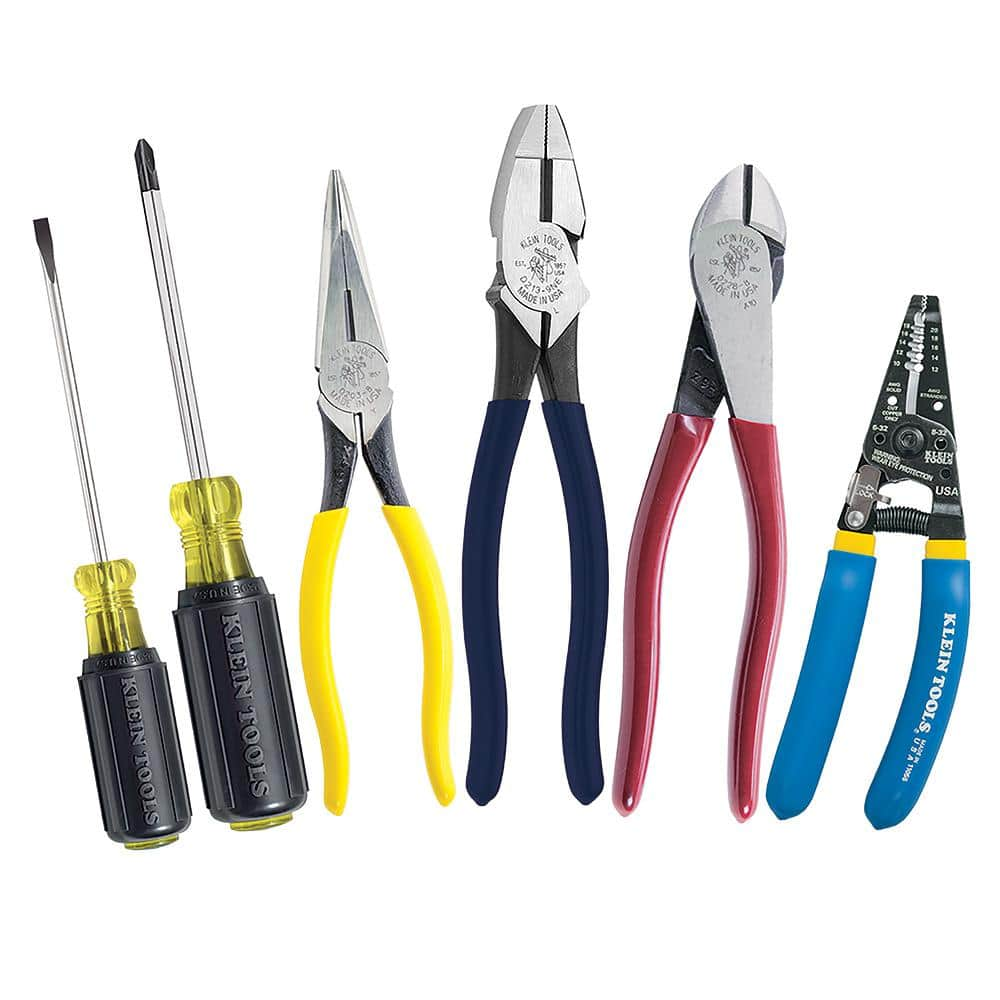
Credit: www.homedepot.com
Frequently Asked Questions
What Tools Does A Electrician Need?
Electricians need multimeters, wire strippers, pliers, screwdrivers, tape measures, voltage testers, and power drills. These tools ensure safety and efficiency.
What Kit Does An Electrician Need?
An electrician needs a toolkit with essential items like screwdrivers, pliers, wire strippers, voltage testers, and a multimeter.
Which Tools Are Used For Electrical Work?
Electricians use tools like pliers, wire strippers, multimeters, voltage testers, screwdrivers, and fish tapes. These tools ensure precise and safe electrical work.
What Is Electrician Tool?
An electrician tool is a device used by electricians to install, repair, and maintain electrical systems. Common tools include wire strippers, pliers, and multimeters.
Conclusion
Having the right electrician tools ensures safety and efficiency in every job. Invest in quality tools for better results. Proper maintenance extends their lifespan. Equip yourself with essential tools to tackle any electrical task confidently. Stay updated with the latest tools for enhanced performance and safety.

